BOARDWATCH: What comes after doubletalk and tripletalk? Maybe CPSBABBLE... Board members prattle on in accustomed roles untethered to any reality... Power Point substitutes for the realities of privatization, charterization and the willful destruction of the real public schools of America's third la
Any reporter who has covered the meetings of the Chicago Board of Education more than once has to have noticed certain patters of Board members' speech. Whether they rehearse or not is probably beside the point. Each of the six or seven members of the Board of Education sits sullenly while dozens of parents, students and teachers point out facts about how the Board's actions are destroying the city's real public schools. Then, at the end of the meeting and before they go into secret session, each of the Board members delivers what amounts to a scripted -- and predictable -- response.
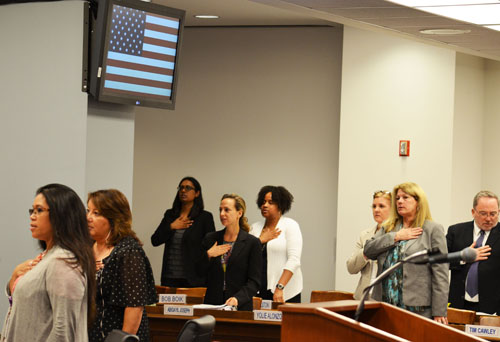 CPS executives recite the Pledge of Allegiance at the beginning of the June 26, 2013 meeting of the Chicago Board of Education. When they make their Power Point presentations on behalf of the latest twists and turns of the school board's massive privatization programs, none of them is under oath, so the truth (whole truth, nothing but the truth) is virtually always left out. Substance photo by George N. Schmidt.Former Northwestern University President Henry Bienen rises to his full dudgeon and reminds everyone that the people who have been critical of the Board's policies don't know what they are talking about. Bienen rarely discusses anything directly with the Board's critics, instead waiting until they are out of the room to spin his version of reality with the supercilious self-importance of the most addled professor of Metaphysics.
CPS executives recite the Pledge of Allegiance at the beginning of the June 26, 2013 meeting of the Chicago Board of Education. When they make their Power Point presentations on behalf of the latest twists and turns of the school board's massive privatization programs, none of them is under oath, so the truth (whole truth, nothing but the truth) is virtually always left out. Substance photo by George N. Schmidt.Former Northwestern University President Henry Bienen rises to his full dudgeon and reminds everyone that the people who have been critical of the Board's policies don't know what they are talking about. Bienen rarely discusses anything directly with the Board's critics, instead waiting until they are out of the room to spin his version of reality with the supercilious self-importance of the most addled professor of Metaphysics.
On June 26, 2013, Bienen's lecture on "economics" was interrupted when Wendy Katten of "Raise Your Hand" shouted out, accurately, that Bienen (as usual) was misrepresenting what she had said during her previous presentation.
The issue was clear enough: During her presentation, Katten had noted several things, among them that the Board's budget actions were destroying major programs at Burley Elementary (where her child attends), that the Board had refused to itemize either its budget claims or the school-by school impact of the so-called "student based budgeting" (but Raise Your Hand had already surveyed 125 schools and confirmed more than $80 million in cuts), and that...
For all the claims that the school closings approved by the Board at its May 22 meeting would "save money," CPS had never done a cost-benefit analysis to determine whether there would be any savings at all. Katten reported that her group had filed a Freedom of Information Act (FOIA) request for the study, and was told by CPS that no such study existed. As a result, all the claims made by CPS beginning in December that the "underutilization crisis" could be solved by closing schools -- and that the closings were going to save a great deal of money -- were unfounded.
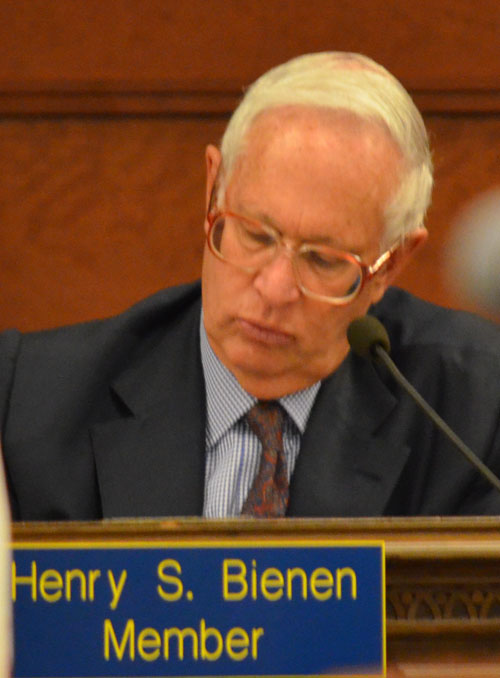 Former Northwestern University President Henry Bienen (above during the June 26 Board meeting) never comments during the presentations given by critics of his policies. Bienen either acts like he is not listening or takes notes, then pounces when the critics are no longer at the podium with his professorial version of reality, usually prefacing his words with some reminder that he is smarter than the people who have criticized the Board. Substance photo by George N. Schmidt.What got Katten's anger visible was that Bienen, after sitting sullenly while Katten actually spoke from the podium was delivering a sententious lecture to the public at the meeting's end about how "basic economics" made it so obvious that anyone could see that closing schools would eventually save money.
Former Northwestern University President Henry Bienen (above during the June 26 Board meeting) never comments during the presentations given by critics of his policies. Bienen either acts like he is not listening or takes notes, then pounces when the critics are no longer at the podium with his professorial version of reality, usually prefacing his words with some reminder that he is smarter than the people who have criticized the Board. Substance photo by George N. Schmidt.What got Katten's anger visible was that Bienen, after sitting sullenly while Katten actually spoke from the podium was delivering a sententious lecture to the public at the meeting's end about how "basic economics" made it so obvious that anyone could see that closing schools would eventually save money.
As a result of that bit of Boardspeak, Katten, like dozens of others the past few months, was snagged by CPS security forces and pushed out of the room.
After which Bienen went on with his Boardeconomics lecture.
It is still unknown how the newest Board member will position herself in the scripts that the Board follows, since she hasn't established a record through several performances. Deborah Quazzo was at her first Board of Education meeting, although her rookie status didn't stop her from speaking. Long-time public education activists in Chicago had never heard of her until a City Hall press release announced that she had become the seventh member of the Chicago Board of Education, appointed by Mayor Rahm Emanuel. Her qualifications include the fact that she had been interested in "innovation," has a degree or two from Harvard, and is part of Chicago's "one percent."
But the other four Board members present on June 26 flowed into predictable furrows of rhetoric.
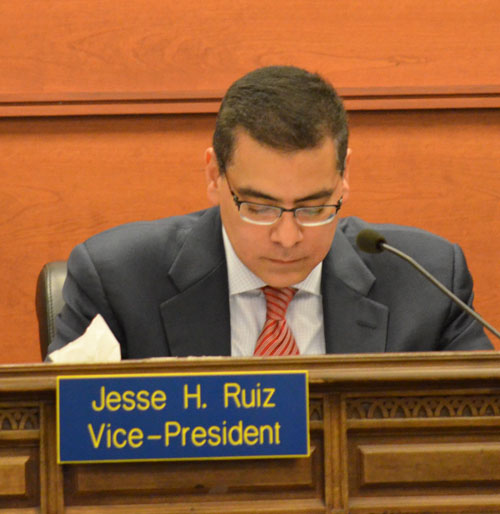 For the first time in memory, Board Vice President Jesse Ruiz didn't remind the audience that his father has been an immigrant with a fifth grade education and that somehow establishes Ruiz's credibility as he votes regularly to destroy the city's real public schools and push the privatization and charterization agenda of the plutocracy that has made him a millionaire lawyer. Substance photo by George N. Schmidt.Board member Jesse Ruiz for the first time in history didn't mention that his father had only completed fifth (or is it sixth) grade in Mexico before all the bootstrapping that brought Jesse Ruiz first to the presidency of the Illinois Board of Education and now to the vice presidency of the Chicago Board of Education. On June 26, the family members and friends mentioned by Ruiz were those who had been teachers but who had been fired as a result of the polices that Ruiz was unctuously assuring the world had to be done because, after all, everyone knows that CPS is facing that "billion dollar deficit." The Ruiz family, the VP let it be known, is suffering like everyone else with a teacher, child, or parent in Chicago's public schools. Although Ruiz's version of reality resembled, to this reporter, the sorrow in the heart and soul of those fascists who had to do a dirty and thankless job -- and so why are you reminding them of it!!?
For the first time in memory, Board Vice President Jesse Ruiz didn't remind the audience that his father has been an immigrant with a fifth grade education and that somehow establishes Ruiz's credibility as he votes regularly to destroy the city's real public schools and push the privatization and charterization agenda of the plutocracy that has made him a millionaire lawyer. Substance photo by George N. Schmidt.Board member Jesse Ruiz for the first time in history didn't mention that his father had only completed fifth (or is it sixth) grade in Mexico before all the bootstrapping that brought Jesse Ruiz first to the presidency of the Illinois Board of Education and now to the vice presidency of the Chicago Board of Education. On June 26, the family members and friends mentioned by Ruiz were those who had been teachers but who had been fired as a result of the polices that Ruiz was unctuously assuring the world had to be done because, after all, everyone knows that CPS is facing that "billion dollar deficit." The Ruiz family, the VP let it be known, is suffering like everyone else with a teacher, child, or parent in Chicago's public schools. Although Ruiz's version of reality resembled, to this reporter, the sorrow in the heart and soul of those fascists who had to do a dirty and thankless job -- and so why are you reminding them of it!!?
Mahalia Hines as usual brought everyone back to her days as a principal and teacher and mother and grandmother. Usually, Hines nit picks at some real or apparent affront that she tries to make a rationale for her racist votes, while reminding the public that she, too, is an African American. This time, Hines didn't have the fact that Shannon Bennett had lost his temper and cussed during the May 22 meeting to become huffily sanctimonious about, so she laid out a line that even made some of her supporters do a doubletake. After talking about how rough the cuts were going to be on the schools (and ignoring the fact that the Board had refused to provide the public either with its budget numbers or with a school-by-school accounting of those cuts), she proclaimed that really great principals have always been able to get the job done. "The really great principals were able to carry on," Hines proclaimed. You can't just find money. This is a very difficult situation for all of us..." Like Ruiz, she wasn't asked to explain how other people's real suffering somehow was the equivalent to her verbiage.
Andrea Zopp of the Urban League as usual claimed that reality was forcing this upon everyone, again also adding her sorrow as a mother, etc., etc., etc. Neither Zopp nor any of her fellow Board members bothered to explain why the public wasn't receiving the annual Proposed Budget in June (as required by tradition, since the fiscal year ends June 30) and why the Board could generate libraries of Power Point twists and turns on just about any subject they wanted to propagandize while refusing to provide the public with a listing of all the cuts being forced on all the schools this week. Zopp, once a trial lawyer, seems to think that she can dance past such realities, then change the subject. The most dramatic stuff, however, came from the Board's administrators, who presented another Power Point version of reality.
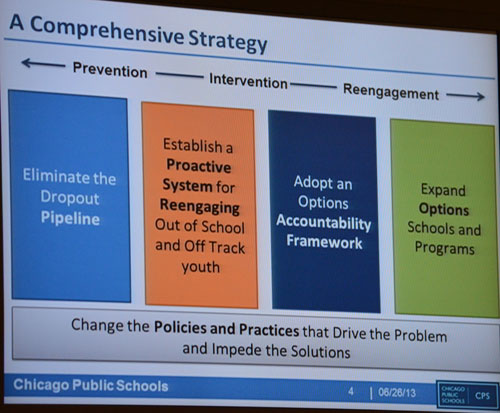 Above, the fourth slide in the Power Point presentation by Jennifer Vidis, who until June 26 had been the "Chief Officer" for the CPS "Alternative Schools" network. Like much else at CPS, the "Alternative Schools Network" has apparently become part of the "failed status quo" that is central to CPS talking points, so the program is being changed -- to "Options [rather than alternative] Schools." The failed status quo was not analyzed, nor did the presentation address how CPS, which has abolished truant officers, can locate thousands of students who had dropped out or been pushed out of Chicago's schools. Like so many of the solutions to the problems facing the city's public schools, the solution of the Byrd Bennett administration consists of rebranding something ("Alternative Schools" are now "Options Schools and Programs") and massive privatization. Substance photo by George N. Schmidt.At the beginning of the meeting, the public was subjected to a Power Point by Barbara Byrd Bennett and Jennifer Vidis, who is "Network Chief" for what had been the "Alternative Schools" network. Watching and listening to the carefully rehearsed Power Point, I realized that most of these Byrd Benett people are in town for as long as it takes to destroy what's left of Chicago's real public schools, while those who have been around a bit longer are just following orders in a tradition that would make them shamefaced were anyone eligible to actually ask them questions about what they were saying. The disconnect between the talking points and the reality had ruptured every last tie between those who rule the schools and those who need them or work in them.
Above, the fourth slide in the Power Point presentation by Jennifer Vidis, who until June 26 had been the "Chief Officer" for the CPS "Alternative Schools" network. Like much else at CPS, the "Alternative Schools Network" has apparently become part of the "failed status quo" that is central to CPS talking points, so the program is being changed -- to "Options [rather than alternative] Schools." The failed status quo was not analyzed, nor did the presentation address how CPS, which has abolished truant officers, can locate thousands of students who had dropped out or been pushed out of Chicago's schools. Like so many of the solutions to the problems facing the city's public schools, the solution of the Byrd Bennett administration consists of rebranding something ("Alternative Schools" are now "Options Schools and Programs") and massive privatization. Substance photo by George N. Schmidt.At the beginning of the meeting, the public was subjected to a Power Point by Barbara Byrd Bennett and Jennifer Vidis, who is "Network Chief" for what had been the "Alternative Schools" network. Watching and listening to the carefully rehearsed Power Point, I realized that most of these Byrd Benett people are in town for as long as it takes to destroy what's left of Chicago's real public schools, while those who have been around a bit longer are just following orders in a tradition that would make them shamefaced were anyone eligible to actually ask them questions about what they were saying. The disconnect between the talking points and the reality had ruptured every last tie between those who rule the schools and those who need them or work in them.
According to the Byrd Bennett presentation, effective apparently now CPS will no longer have "Alternative Schools" or a "Network" of "Alternative Schools." Like so much else in CPS the past couple of years, the "Alternative Schools" stuff has undergone an extreme makeover.
History note: The "Alternative Schools" pre-date even mayoral control. They were established during the 1980s to provide some education to kids who had been kicked out of the city's real public schools (long before the days of charter schools and massive privatization). Many of these kids were beset with such massive social, emotional and educational problems that the city's traditional public schools were not equipped to handle them, and their presence in the real public schools could be extremely disruptive.
To listen to the June 26 Power Point presentation, an observer would think the presenters were talking about some failed "status quo" that is so often featured in CPS talking points.
The Board members might have found it difficult to believe that the presenter had been around for some time, so might be considered a part of that "failed status quo" that needed rebranding, if nothing else. Vidis had been an "AIO" (that was "Area Instructional Officer") under Arne Duncan and Ron Huberman, then a "CAO" ("Chief Instruction Officer") under Jean-Claude Brizard, then a "Network Chief" under Brizard and lately Barbara Byrd Bennett.
During those years of rebranding the sub-district chieftains, for the various iterations of the "alternative schools" thingy that CPS cooked up several years back, apparently (at least to those listening on June 26, 2013) the alternative schools programs failed. If there has been a "failed status quo" that resulted in all those tens of thousands of kids who aren't in school (and apparently can't even be located, except by guesswork and evasions), we have been staring at it since mayoral control began in 1995 and eliminated, among other necessities, truant officers.
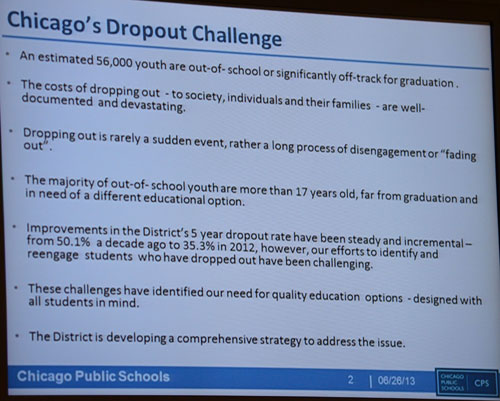 Ignoring both history and context, Vidis's slide presented the "dropout challenge" without noting that for two decades the Chicago Board of Education has not had truant officers. Vidis also spoke about the problem as if she had not been in charge of the "Alternative Schools" for the past half-decade under four Chief Executive Officers. The current CPS solutions to all problems -- privatization and "rebranding" -- were the solutions offered by Vidis. No Board member challenged anything about the presentation. Substance photo by George N. Schmidt.Neither context nor history. Just Power Point blather. Every Board meeting sounds as if nobody knew anything about any of the reality or history of Chicago. We have been reduced to a world where squishy and evasive words (some no doubt focus group tested), spreadsheet lies, Power Point nonsense, and computer generated graphics have become reality itself. To do justice to this system this month requires a combined Voltaire and Jonathan Swift. The best we can do here is report accurately in context what is being said and done.
Ignoring both history and context, Vidis's slide presented the "dropout challenge" without noting that for two decades the Chicago Board of Education has not had truant officers. Vidis also spoke about the problem as if she had not been in charge of the "Alternative Schools" for the past half-decade under four Chief Executive Officers. The current CPS solutions to all problems -- privatization and "rebranding" -- were the solutions offered by Vidis. No Board member challenged anything about the presentation. Substance photo by George N. Schmidt.Neither context nor history. Just Power Point blather. Every Board meeting sounds as if nobody knew anything about any of the reality or history of Chicago. We have been reduced to a world where squishy and evasive words (some no doubt focus group tested), spreadsheet lies, Power Point nonsense, and computer generated graphics have become reality itself. To do justice to this system this month requires a combined Voltaire and Jonathan Swift. The best we can do here is report accurately in context what is being said and done.
And by whom at what cost in dollars and human terms.
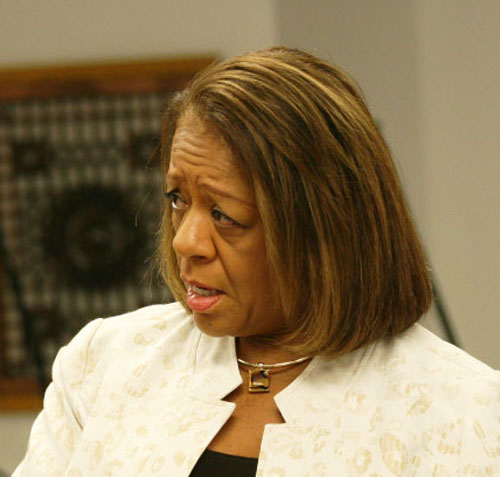 Chicago Public Schools "Chief Executive Officer" Barbara Byrd Bennett (above during the June 26 meeting of the Board of Education) has been in Chicago less than 18 months following her stint destroying the public schools of Detroit following the scripts of the Broad Foundation. Substance photo by David Vance.High points came for me when Barbara Byrd Bennett, with a straight face, told the Board that her "Chief Innovation and Incubation Officer" would handle one thing. Oh, and while the new "Chief Accountability Officer" (which she actually said was a new idea) would handle something else.
Chicago Public Schools "Chief Executive Officer" Barbara Byrd Bennett (above during the June 26 meeting of the Board of Education) has been in Chicago less than 18 months following her stint destroying the public schools of Detroit following the scripts of the Broad Foundation. Substance photo by David Vance.High points came for me when Barbara Byrd Bennett, with a straight face, told the Board that her "Chief Innovation and Incubation Officer" would handle one thing. Oh, and while the new "Chief Accountability Officer" (which she actually said was a new idea) would handle something else.
CPS has had a "Chief Accountability Officer" since the late Phil Hansen did that dirty work for Paul Vallas beginning a couple of decades ago. As to our "Chief Innovation and Incubation Officer" -- well, that guy seems to have materialized, like one of those TV zombies, about the time CPS realized it hadn't really needed a "Chief Portfolio Officer." And of course, the "Chief Human Capital Officer" morphed into the "Chief Talent Officer" without changing her pout. The list is long, and doesn't begin or end with the "Chief of Chiefs" (who was nodded to today) and all the other mercenaries currently placeholding and dollar-sucking at 125 S. Clark St.
But for a moment, back to the "alternative schools" nonsense. The first thing is that they are getting a new name, too. (I think I heard "Optionals" -- the CPS elves distributing the Power Points didn't distribute at our row in the press section...).
"Alternative Schools" can't survive in a world of Orwellian lexicography where evasion is prized the precision evaded. Also, if you chance the names of things regularly (see., e.g., "Talent" for "Human Capital" and "Whatever Happened to That Portfolio Guy?"...)...
So, "Portfolio" has been retired.
"Talent" replaced, for now at least, "Capital."
And Byrd Bennett elbowed out Brizard with nary a nod to that "status quo."
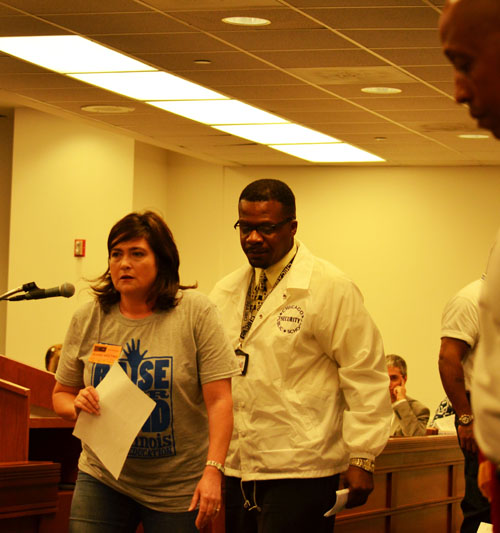 Raise Your Hand's Wendy Katten (above right) was forced from the podium by security after the Board members sat silently following her questions about the fate of the schools being cut and the refusal by the Board to do a cost benefit analysis of the "underutilization" savings CPS had claimed. Later, when Board member Henry Bienen claimed that Katten didn't understand what Bienen calls "economics", Katten, who had remained in the room, called out that he was misrepresenting what she had said, resulting in a second encounter with security. Substance photo by George N. Schmidt. This year, we have gone from "Children First Schools" in September 2012 (the scab centers that no children attended during the September strike) to the "Welcoming Schools" in June 2013 (the smiley faces pasted on the massive closings Byrd Bennett and the Board just did. And, of course, we have also gone from "J.C." to "BBB" -- and I'm sure beyond.
Raise Your Hand's Wendy Katten (above right) was forced from the podium by security after the Board members sat silently following her questions about the fate of the schools being cut and the refusal by the Board to do a cost benefit analysis of the "underutilization" savings CPS had claimed. Later, when Board member Henry Bienen claimed that Katten didn't understand what Bienen calls "economics", Katten, who had remained in the room, called out that he was misrepresenting what she had said, resulting in a second encounter with security. Substance photo by George N. Schmidt. This year, we have gone from "Children First Schools" in September 2012 (the scab centers that no children attended during the September strike) to the "Welcoming Schools" in June 2013 (the smiley faces pasted on the massive closings Byrd Bennett and the Board just did. And, of course, we have also gone from "J.C." to "BBB" -- and I'm sure beyond.
Any bureaucracy that can with a straight face discuss all the kids who have been disappeared from the nation's third largest school system while babbling about "metrics" without mentioning that CPS doesn't have truant officers (the men and women who used to know how to find all those kids, until they were disappeared a long time ago) would be a parody of dysfunction. Were this all not so serious.
The best some of us can do is to "memorialize" every one of these six-figure mercenaries and neither forget nor ever forgive. As the six members of the Chicago Board of Education added the latest dose of their sententious hypocrisies to the cloud of vaporous nonsense that hovers above Clark St. once a month, the least we could do was never forget that as they were proclaiming and repeating their lies and inanities, thousands of children and their families were having their lives undermined or even destroyed behind the smokescreen of those locutions.
Chicago has survived a lot and will survive these Power Point desk jockeys and their sanctimonious enablers.
We will continue making that contribution here as resources and time permit.
I realized that these people are in town for as long as it takes to destroy what's left of Chicago's real public schools. The disconnect between the talking points and the reality had ruptured every last tie between those who rule the schools and those who need them or work in them.
Comments:
By: Rod Estvan
More on Mr. Beinen and Bear Stearns collapse
Additional information relating to Mr. Bienen's votes on the Bear Stearns Board of Directors.
Please see http://www.scribd.com/doc/30942447/Minutes-of-Bear-Stearns-Board-Meeting where Mr. Bienen voted for members of the Finance and Risk Committee in 2007 that failed to stop the eventual collapse of the firm. By rule this Committee was to meet only once a year.
See http://www.scribd.com/doc/30943099/S-E-C-Risk-Management-Reports where the SEC notes back in 2006, while Mr. Bienen was on the Bear's Board that the firm was radically increasing its "mortgage" backed inventories up to $13.9 billion. The head of risk management reported to the SEC that Bear was trying to reduce its exposure in the mortgage backed securities, but the firm actually increased its holdings over the next year. In this same report it is noted that Bear's global head of risk management resigned and no replacement had been hired. You will find numerous other references in these SEC reports to the growing mortgage backed securities business and the increased risk associated with it.
Below is a short comment on the complete incompetence of Mr. Bienen and the Bear Board in the wake of the collapse of that firm by J Robert Brown professor of law at University of Denver Sturm College of Law. Professor Brown for more than two decades has taught corporate and securities law, with a particular emphasis on corporate governance. He has authored numerous publications in the area and several of his articles have been cited by the US Supreme Court.
Bear Stearns and a Sleeping Board?
J. Robert Brown | Wednesday, May 28, 2008 at 11:00AM
The WSJ ran a story about the waning days of Bear Stearns and the concerns expressed within the investment banking firm in the days and months leading to its ultimate demise. At one point, buried in the piece, the WSJ described the board as "12 men largely handpicked by Mr. Cayne." We have more or less made this point before. The board was not diverse and contained a large number of individuals who had served with Bear Stearn's management for more than a decade. And they were well paid.
We don't know what happened inside the board room. But serving for long periods of time with the same management can easily impair a director's independence. Moreover, the lack of diversity on the board probably reduced the likelihood that management would hear alternative views. What Bear Stearns (and the shareholders of Bear Stearns) needed was a board that could ask management tough questions. The dynamics of this board suggest that this is not what they got.
Posted by Rod Estvan


By: Rod Estvan
Bear Stearns anyone? Mr. Beinen's comments at Board meeting
This has to be one of George Schmidt's more brilliant descriptions of a CPS Board meeting he has ever written. Praise for George's searing criticism aside I have to admit I am starting to find Board member Henry Bienen particularly irritating, maybe it's the fact that I am now 60 plus years old, or maybe it's that Mr. Beinen attempts to present himself as a fiscal expert when his academic background was in foreign policy.
It appears that he has decided to play the role of the former CPS Board member Norm Bobbins, but Norm to his credit actually had a background in finance.
Possibly Mr. Beinen's most prominent foray into the world of finance was as a member of the Board of Directors of Bear Stearns beginning in 2004 until that firm's collapse during the financial crisis of 2008. Now that is something to be proud of, being on the last Board of a company that existed from 1923 and watching it's destruction.
William Cohan's book, "House of Cards: A Tale of Hubris and Wretched Excess on Wall Street," published by Doubleday,sheds light on the bankers who destroyed Bear Stearns while Mr. Beinen and his fellow Board members read falsified balance sheets and ate lunch.
Former Wharton School dean Russell Palmer, in his book "Ultimate Leadership," directly discusses Beinen and his fellow Bear Stearns Board members writing:
"Boards of directors must provide appropriate oversight, but boards will never know enough about the complex world of finance and the derivatives transactions that are being effected today. Boards need to provide detailed oversight, and so they have the responsibility to see that outside experts are brought in, if necessary, to assess the risk profile of the organization. They have to rely on experts such as their auditors, regulators, and others to see that effective oversight occurs." Clearly Beinen and his compatriots did not assure that effective oversight occurred at Bear Stearns.
They sat and watched Bear's stock price plummet from the high hundreds to an eventual $10 a share offer from JP Morgan Chase. Beinen and his fellow Board members accepted this deal on behalf of stock holders that had just lost millions upon millions of dollars.
Instead of fiscal oversight the Bear Stearns Board concerned itself with CEO James Cayne's pot use in the wake of a Wall Street Journal article. Beinen and other Board members more or less forced Cayne to resign as CEO in the wake of his month long vacations to play cards, and other high jinks at the headquarters. The board kept Cayne on as chairman, and Alan D. Schwartz takes over as CEO. By March 14, 2008 Bear Stearns was in full collapse and its chairman Cayne was taking part in a bridge tournament in Detroit. Yes, really you can't make this stuff up if you wanted to.
I have a real problem with Mr. Beinen trying to play the role of the fiscal expert on the Board with this track record. His comments as reported by Catalyst in relation to Ms Katten's and others' statements before the Board were that he had heard “a lot of things that are just nonsense and ranting” in relation to fiscal issues. I have no doubt Mr. Beinen is familiar with nonsense and ranting he must have gotten a lot of that from the executives at Bear Stearns when he was on its Board. Really a little humility is in order after that experience isn't it?
Rod Estvan